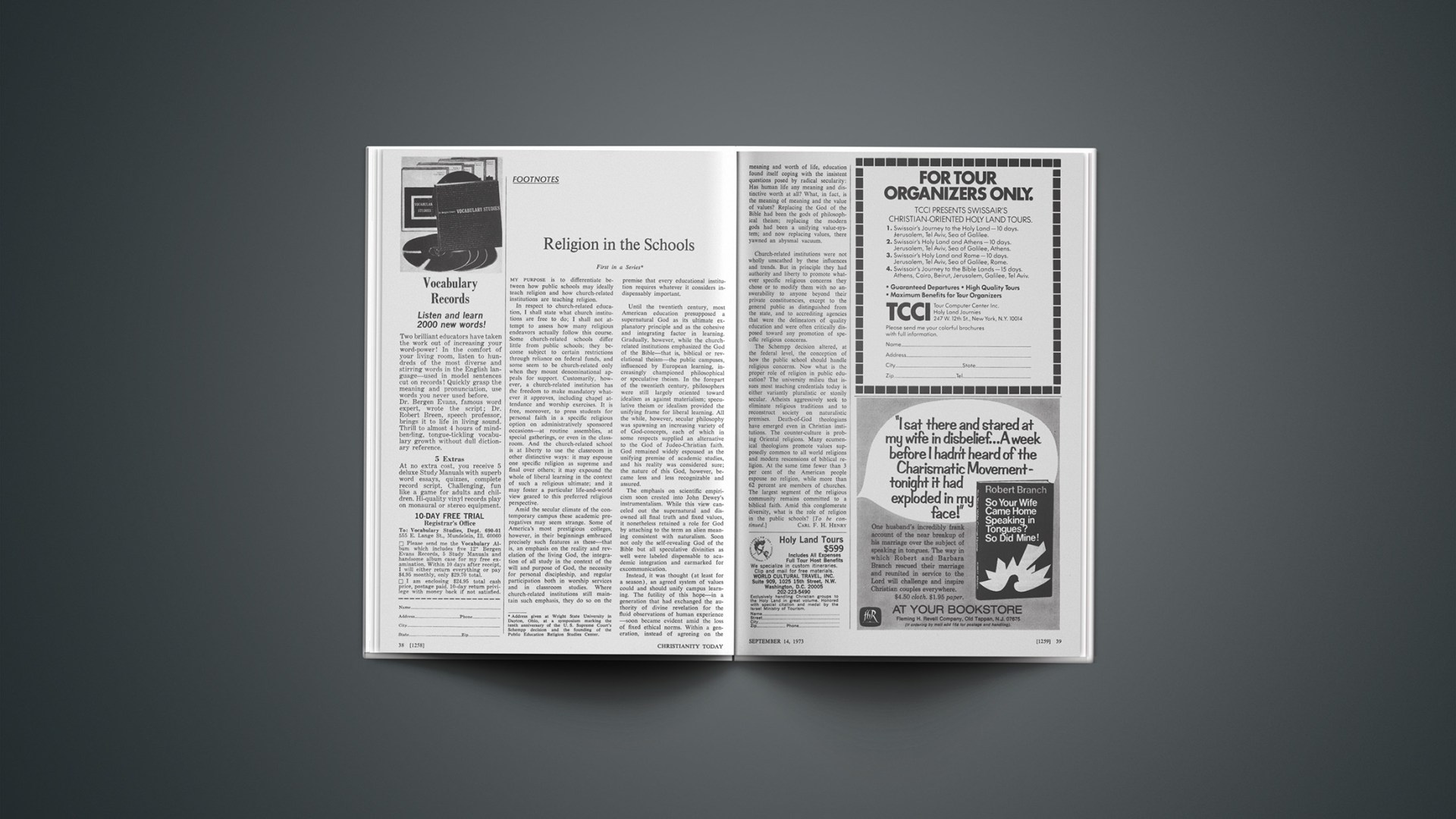First in a Series1Address given at Wright State University in Dayton, Ohio, at a symposium marking the tenth anniversary of the U. S. Supreme Court’s Schempp decision and the founding of the Public Education Religion Studies Center.
My purpose is to differentiate between how public schools may ideally teach religion and how church-related institutions are teaching religion.
In respect to church-related education, I shall state what church institutions are free to do; I shall not attempt to assess how many religious endeavors actually follow this course. Some church-related schools differ little from public schools; they become subject to certain restrictions through reliance on federal funds, and some seem to be church-related only when they mount denominational appeals for support. Customarily, however, a church-related institution has the freedom to make mandatory whatever it approves, including chapel attendance and worship exercises. It is free, moreover, to press students for personal faith in a specific religious option on administratively sponsored occasions—at routine assemblies, at special gatherings, or even in the classroom. And the church-related school is at liberty to use the classroom in other distinctive ways: it may espouse one specific religion as supreme and final over others; it may expound the whole of liberal learning in the context of such a religious ultimate; and it may foster a particular life-and-world view geared to this preferred religious perspective.
Amid the secular climate of the contemporary campus these academic prerogatives may seem strange. Some of America’s most prestigious colleges, however, in their beginnings embraced precisely such features as these—that is, an emphasis on the reality and revelation of the living God, the integration of all study in the context of the will and purpose of God, the necessity for personal discipleship, and regular participation both in worship services and in classroom studies. Where church-related institutions still maintain such emphasis, they do so on the premise that every educational institution requires whatever it considers indispensably important.
Until the twentieth century, most American education presupposed a supernatural God as its ultimate explanatory principle and as the cohesive and integrating factor in learning. Gradually, however, while the church-related institutions emphasized the God of the Bible—that is, biblical or revelational theism—the public campuses, influenced by European learning, increasingly championed philosophical or speculative theism. In the forepart of the twentieth century, philosophers were still largely oriented toward idealism as against materialism; speculative theism or idealism provided the unifying frame for liberal learning. All the while, however, secular philosophy was spawning an increasing variety of of God-concepts, each of which in some respects supplied an alternative to the God of Judeo-Christian faith. God remained widely espoused as the unifying premise of academic studies, and his reality was considered sure; the nature of this God, however, became less and less recognizable and assured.
The emphasis on scientific empiricism soon crested into John Dewey’s instrumentalism. While this view canceled out the supernatural and disowned all final truth and fixed values, it nonetheless retained a role for God by attaching to the term an alien meaning consistent with naturalism. Soon not only the self-revealing God of the Bible but all speculative divinities as well were labeled dispensable to academic integration and earmarked for excommunication.
Instead, it was thought (at least for a season), an agreed system of values could and should unify campus learning. The futility of this hope—in a generation that had exchanged the authority of divine revelation for the fluid observations of human experience—soon became evident amid the loss of fixed ethical norms. Within a generation, instead of agreeing on the meaning and worth of life, education found itself coping with the insistent questions posed by radical secularity: Has human life any meaning and distinctive worth at all? What, in fact, is the meaning of meaning and the value of values? Replacing the God of the Bible had been the gods of philosophical theism; replacing the modern gods had been a unifying value-system; and now replacing values, there yawned an abysmal vacuum.
Church-related institutions were not wholly unscathed by these influences and trends. But in principle they had authority and liberty to promote whatever specific religious concerns they chose or to modify them with no answerability to anyone beyond their private constituencies, except to the general public as distinguished from the state, and to accrediting agencies that were the delineators of quality education and were often critically disposed toward any promotion of specific religious concerns.
The Schempp decision altered, at the federal level, the conception of how the public school should handle religious concerns. Now what is the proper role of religion in public education? The university milieu that issues most teaching credentials today is either variantly pluralistic or stonily secular. Atheists aggressively seek to eliminate religious traditions and to reconstruct society on naturalistic premises. Death-of-God theologians have emerged even in Christian institutions. The counter-culture is probing Oriental religions. Many ecumenical theologians promote values supposedly common to all world religions and modern rescensions of biblical religion. At the same time fewer than 3 per cent of the American people espouse no religion, while more than 62 percent are members of churches. The largest segment of the religious community remains committed to a biblical faith. Amid this conglomerate diversity, what is the role of religion in the public schools? [To be continued.]




